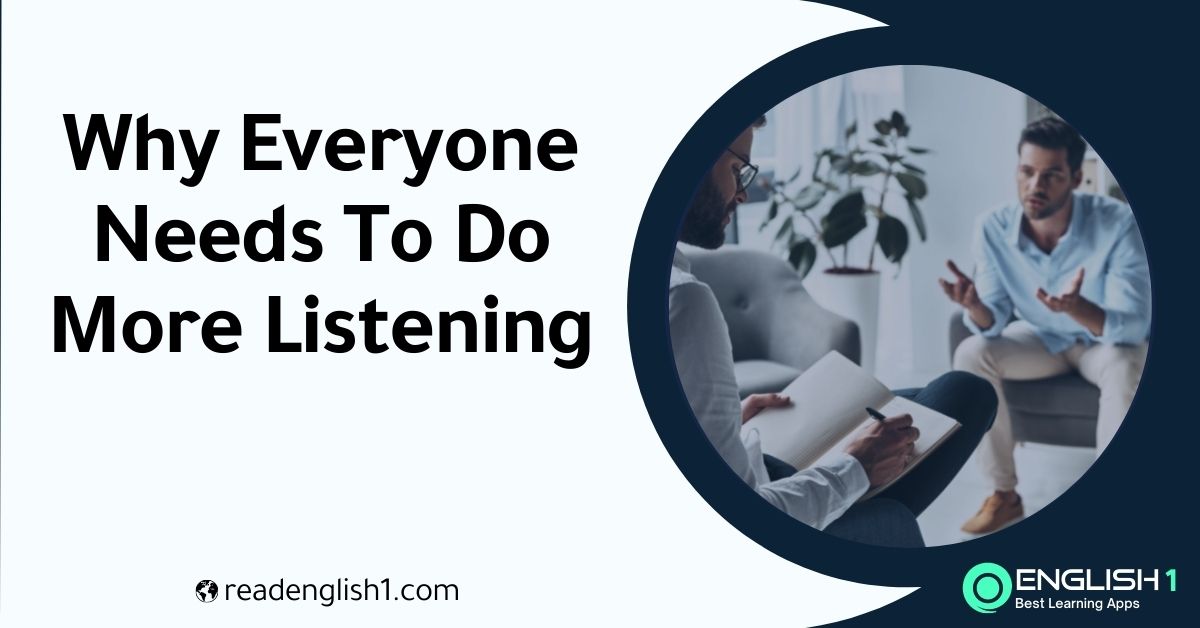Listening is a skill that can make a significant difference in your life. It enables you to understand people better, which allows you to connect with them on a deeper level. Listening can even help you discover the hidden gems and potential solutions within people and their problems.
Listening is important, but we often don’t think of it as an essential skill. We may have to remind ourselves that it is an important part of communication and the way we can improve our relationships with others. Listening helps us understand people better, learn from them, and respect their opinion and feelings. In short, we all need to do more listening.
In this age of technology, many people find it difficult to simply listen. We are constantly checking our phones, watching videos, or scrolling through newsfeeds. But you can’t build a great company or have meaningful conversations if you’re not listening. Here’s how to do it better.
Technology and the Internet have made it possible for us to communicate and collaborate in ways that were never before possible. However, this has also changed the way we communicate and make decisions as well. Technology has made it easier for us to share our ideas, but it has also made it harder to actually listen to one another. This is why everyone needs to do more listening.
Listening Builds Trust
Listening is the single most important part of effective communication. You can do anything you want with your words and ideas, but if others don’t trust you or feel that they are not believed, then what’s the point? People value honesty and trust in their leaders. These people will also know how to listen to needs from those within their ranks leading them down a different path than one another would choose themselves (consider Bertrand Russell ).
Although we can’t control the things that people say and ideas they share, we can all make a better effort to listen more often. In particular, people may be talking about topics that you don’t always have time for during office hours or at home (or even on vacation). Even though it’s not possible to communicate with everyone in our lives 24/7, listening will help us get what is really important into our daily thoughts and conversations. Listening will allow us to develop a trusting attitude that will aid in being more effective.
Additionally, listening can help you establish respect for others and their ideas by understanding why they believe what they do as well as identifying any potential problems from your perspective. By taking the time out of your daily routine to identify how other people think about issues before choosing when and how to communicate with them may be one of the most important things you do all day.
Building Empathy through Listening
Empathy is a hidden gem that most people take for granted. Unless you consider yourself to be very self-aware, it’s easy to overlook the fact that we don’t always think or act in logical ways (we may even tend not to trust our own feelings when they are different from those of an authority figure). But one positive consequence of listening well (which also prevents judgmental belief systems), is awareness and conscious understanding of common human motivations.
For example, when we are listening to someone who is obviously angry or upset at the other person’s actions, our viewing of them as one less reasonable than ourselves sometimes cause us not to consider their viewpoint. The simple fact that there exists this deep-seated commonality between all human beings means adversaries can identify with each other. In essence, people may reciprocate empathy by identifying what makes someone ‘tick’ and reacting accordingly (e .g. accepting the logic of their position rather than arguing against it). When you consider that, in many cases, adversaries will not actually agree on any issue and just have different interpretations of what they think is happening, an empathetic approach to communication becomes a possible antidote for conflict. See also, listening to English is a skill.
Listening and Emotional Intelligence
Listening is an important skill to develop, on various levels (formal and informal). One of the most common barriers people face when being listened to is emotional detachment. Having sufficient emotional intelligence can cause others not only feel heard but also helped, which in turn creates a greater chance of favorable outcomes with respect both formal relationships and authentic personality growth.
Listening Makes You an Open-Minded Person
It helps to see what others are actually saying, so we can have a more ‘integrated’ view of their viewpoints. By listening you gain the empathy necessary for understanding another’s emotional experiences and world-view. Being empathetic allay people’s tendencies towards defense. So when looking at someone else being met with indifference or hostility without due reason, they end up feeling wronged and defensive, which in turn creates very unproductive situations (e .g. very infighting and conflict ).
By being open-minded, your mind will be freed from the burden of biased assumptions! The ability to listen well enables you find the best approach(es) towards resolving a problem with another person by ‘adding on’ information that’s relevant at hand. You learn more about them when they share their own experiences rather than their perceived truths (and potentially misplaced beliefs). Laughing is an underrated way to improve communication, it breaks the ice of hesitancy by lightening tension, and simply being ‘in a good mood’.
Laughing alleviates negative emotions by expressing genuine enjoyment. A recent study had participants perform repetitive touches on an unidentified surface while watching videos that were meant to create pleasure or anxiety (the object was just used their hand though!).
All in all, communication is a vital part of any relationship. And if you’re really concerned about your communication skills, check out this article. It’s written by an academic that specializes in interpersonal relationships. You May Like learn English.

